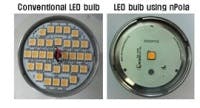Seoul Semiconductor claims 5x lumen density with non-polar LEDs (Updated)
Non-polar GaN
Seoul Semiconductor’s patented nPola approach has been under development for over 10 years. According to the company, the lumen density of its LEDs has been dramatically improved by 5x over the conventional LED based on equivalent die surface area and it expects to further improve this margin to 10x with future implementations.
With this approach, Seoul Semiconductor claims that fewer LEDs are needed to achieve a given light output per replacement bulb. For example, in a 60W-equivalent LED lamp, generally 10-20 LED packages are used, but with the nPola product, the same light output could be achieved using 1-2 packages. Seoul also claims that while the luminous flux of a power chip LED in mass production is approximately 100 lm (warm white) today, this new product could produce 500 lm by driving the LED at higher current densities.
Seoul Semiconductor CEO, Chung Hoon Lee, expressed strong confidence in the new product by saying "I've worked very hard for the past 20 years in this industry and it is safe to say that this new product is the culmination of 20 years of core technologies development. It is a major milestone for the LED light source."
UC Santa Barbara receives $500,000 for Endowed Chair
UC Santa Barbara's Solid State Lighting & Energy Center (SSLEC), a provider of leading-edge research in energy-efficient lighting, power electronics, and solar energy technology, has received a $500,000 endowment from Seoul Optodevice Company to further its research on GaN for use in electronics and solid-state lighting (SSL).
James Speck, a professor of materials at UCSB, member of SSLEC's Executive Committee, and director of the Interdisciplinary Center for Wide Band-Gap Semiconductors, has been named the campus's first Seoul Optodevice Chair in Solid State Lighting.
"This endowment by Seoul Optodevice Company is critically important because our research in gallium nitride semiconductors places the college at the forefront of energy efficiency technology," said Rod Alferness, dean of the College of Engineering. "Professor Speck is leading this charge and understands how our relationship with industry is a driving force behind discoveries in solid state lighting."
Speck's research focuses on the relationship between thin-film electronic materials growth, and microstructure, as well as the link between microstructure and physical properties. In 2010, he received the IEEE Photonics Society Aron Kressel Award for his work on nonpolar and semipolar GaN-based materials and devices.







